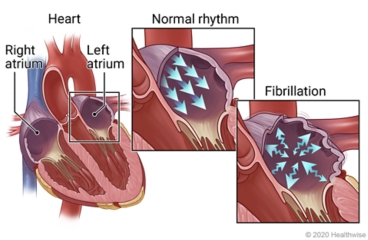Atrial Fibrillation: Care Instructions
Overview

Atrial fibrillation is an irregular and often fast heartbeat. Treating this condition is important for
several reasons. It can cause blood clots, which can travel from your heart to your brain and cause a stroke.
An irregular heartbeat can also increase your risk for heart failure. If you have an episode of atrial
fibrillation, you may feel a fluttering, racing, or pounding feeling in your chest called palpitations. You
may feel short of breath, lightheaded, dizzy, or weak.
Treatment can help you feel better and prevent future problems. Treatments can slow the heart rate, control
the heart rhythm, or help prevent stroke. You will likely take medicine. You may have a procedure, such as
electrical cardioversion or catheter ablation.
You can live well and help manage atrial fibrillation by having a heart-healthy lifestyle. This lifestyle may
help reduce symptoms and how often you have episodes.
Follow-up care is a key part of your treatment and safety. Be sure to make and go to all
appointments, and call your doctor if you are having problems. It's also a good idea to know your test results
and keep a list of the medicines you take.
How can you care for yourself at home?
-
Be safe with medicines.
-
Take your medicines exactly as prescribed. Call your doctor if you think you are having a problem with
your medicine. You will get more details on the specific medicines your doctor prescribes.
-
If your doctor has given you a blood thinner to prevent a stroke, be sure you get instructions about
how to take your medicine safely. Blood thinners can cause serious bleeding problems.
-
Do not take any vitamins, over-the-counter drugs, or herbal products without talking to your doctor
first.
-
Have a heart-healthy lifestyle.
-
Try to quit or cut back on using tobacco and other nicotine products. This includes smoking and
vaping. Avoid secondhand smoke too.
-
Eat heart-healthy foods. These include vegetables, fruits, nuts, beans, lean meat, fish, and whole
grains. Limit sodium and sugar.
-
Limit alcohol. Limit alcohol to 2 drinks a day for men and 1 drink a day for women. Avoid alcohol if
it triggers symptoms.
-
Be active. Try to get at least 30 minutes of physical activity on most days of the week. Talk to your
doctor about what type and level of exercise is safe for you.
-
Stay at a weight that's healthy for you. Talk to your doctor if you need help losing weight.
-
Try to manage stress.
-
Try to get 7 to 9 hours of sleep each night.
-
Manage other health problems such as high blood pressure, high cholesterol, and diabetes. If you think
you may have a problem with alcohol or drug use, talk to your doctor.
-
Avoid infections such as COVID-19, colds, and the flu. Get the flu vaccine every year. Get a
pneumococcal vaccine. If you have had one before, ask your doctor whether you need another dose. Stay up
to date on your COVID-19 vaccines.
-
Learn how to manage symptoms.
-
Make a symptom action plan with your doctor. This will help you know what to do when you have an
episode of atrial fibrillation.
-
Use a symptom diary to find what triggers your symptoms. If you know your triggers, you can take steps
to avoid them.
-
Check your pulse regularly if your doctor recommends it. Place two fingers on the artery at the palm side
of your wrist, in line with your thumb.
When should you call for help?
 Call 911
anytime you think you may need emergency care. For example, call if:
Call 911
anytime you think you may need emergency care. For example, call if:
Call your doctor now or seek immediate medical care if:
Watch closely for changes in your health, and be sure to contact your doctor if you have
any problems.
Current as of: June 24, 2023
Content Version: 14.0
Care instructions adapted under license by your
healthcare professional. If you have questions about a medical condition or this instruction, always ask
your healthcare professional. Healthwise, Incorporated disclaims any warranty or liability for your use of
this information.